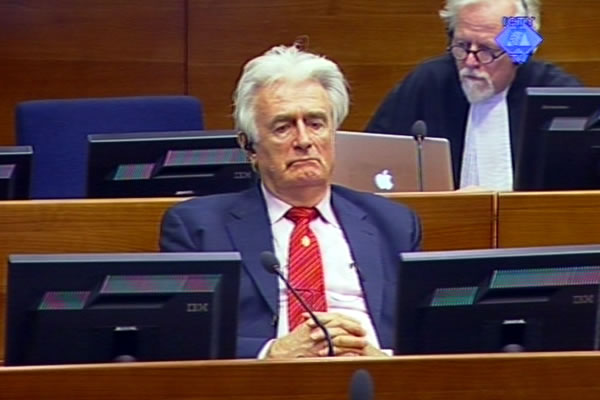Home
KARADZIC WANTS A SUBPOENA FOR CUTILEIRO
The accused intends to call Portuguese diplomat Jose Cutileiro, former international negotiator in the talks about the future of BH. Cutileiro doesn’t want to come to The Hague and the accused has asked the Trial Chamber to issue a subpoena compelling him to testify
 Radovan Karadzic in the courtroom
Radovan Karadzic in the courtroom The former Republika Srpska president insisted during the prosecution’s case that he had been committed to finding a peaceful solution for the crisis in BH in 1992. To prove it, Karadzic indicated he would call to the witness stand Portuguese diplomat Jose Cutileiro, who was appointed by the European Community to act as a mediator in the negotiations between the three sides in Bosnia and Herzegovina in late 1991 and early 1992. Cutileiro refused to appear in court and today Karadzic requested the judges to issue a binding order, or a subpoena, compelling Cutileiro to give evidence.
On 20 February 2012, Ambassador Cutileiro agreed to be interviewed by the legal advisor of the accused. A bit later, in April 2012, Cutileiro signed his written statement. At the same time Cutileiro insisted that he didn’t want to appear in court as a witness for either of the parties. As Cutileiro explained, international negotiators should not give evidence in criminal proceedings. It could ‘threaten their work’ as the parties in future negotiations may feel that everything they say in the talks could later be used in court, Cutileiro said.
In order for a binding order to be issued, the party requesting it must show that it has made ‘every reasonable effort’ to persuade the witness to testify willingly; if those efforts fail, the judges will issue a binding order. Karadzic contends that this requirement has been met regarding Cutileiro’s testimony. Karadzic also must show that the evidence sought is relevant for the case and important for a fair trial of the accused.
As Karadzic explains, the claims made in Cutileiro’s statement to the defense representative show his testimony is relevant. In the statement, Cutileiro described the progress of the peace talks. In the spring of 1992, Karadzic accepted the plan under which BH was to be divided into three constituent units – Muslim, Serb and Croat – with full respect for the ethnic and religious freedoms of all citizens. In its motion, the defense claims that the Serb leadership, headed by Karadzic and the Bosnian government, headed by Alija Izetbegovic, agreed to the plan. In June 1992, the Bosnian side decided to ditch it.
According to Karadzic, Cutileiro’s statement contains other purported signs that the Serb leadership was committed to finding a peaceful solution to the crisis. In August 1992, the Serb leadership agreed to ‘give back territories to Muslims in exchange for a full political autonomy’ of the Serb entity, and supported the program for the return of refugees and deployment of UN observers along the Serb artillery positions around Sarajevo.
Karadzic contends that Cutileiro’s testimony is ‘relevant and necessary’ for his trial, asking the Trial Chamber to issue a subpoena to Cutileiro compelling him to testify in The Hague. Karadzic recalls that some other former international negotiators, such as Herbert Okun, David Harland and Anthony Banbury, have already appeared as witnesses.
Linked Reports
- Case : Karadzic
- 2012-09-19 KARADZIC HAS 300 HOURS FOR HIS CASE
- 2012-09-11 KARADZIC SUBMITS REVISED WITNESS LIST
- 2012-09-03 KARADZIC WILL NOT OPPOSE AMICUS CURIAE STATUS FOR VICTIMS
- 2012-09-21 VICTIMS WILL NOT BE AMICI CURIAE IN KARADZIC CASE
- 2012-09-24 300 HOURS NOT ENOUGH FOR KARADZIC’S DEFENSE CASE
- 2012-09-26 PROSECUTION WANTS GENOCIDE CHARGE TO BE RESTORED TO KARADZIC INDICTMENT
